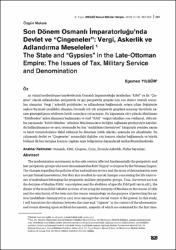| dc.contributor.author | Yılgür, Egemen | |
| dc.date.accessioned | 2021-03-11T20:13:22Z | |
| dc.date.available | 2021-03-11T20:13:22Z | |
| dc.date.issued | 2018 | |
| dc.identifier.issn | 1309-4815 | |
| dc.identifier.uri | https://app.trdizin.gov.tr/makale/TXpBNU1USTRPQT09 | |
| dc.identifier.uri | https://hdl.handle.net/20.500.12879/36 | |
| dc.description.abstract | 19. yüzyıl modernleşme hareketlerinin Osmanlı İmparatorluğu tarafından “Kıbtî” ya da “Çingene” olarak adlandırılan peripatetik ve geç-peripatetik gruplar için son derece önemli sonuçları olmuştur. Vergi / askerlik politikaları ve adlandırma bağlamında ortaya çıkan değişimler sadece biçimsel yenilikler olmanın ötesinde tek tek peripatetik gruplara mensup bireylerin yaşam güzergahlarını etkileyen kritik sonuçlara yol açmıştır. Bu kapsamda 1873 yılında Müslüman “Kıbtîlerden” asker alınmaya başlanması ve özel “Kıbtî” vergisi tahsiline son verilmesi, 1881 nüfus sayımında “Kıbtî-i Müslim” tabirinin Müslümanların birliğini sağlamak gerekçesiyle kayıtlarda kullanılmaması ve 1905 sayımında bu kez “muhâfaza-i kavmiyyet” kaygısıyla yeniden sayım ve kayıt terminolojisine dahil edilmesi bu dönemin kritik olayları arasında yer almaktadır. Bu çalışmada devlet ve “Çingeneler” arasındaki ilişkiler, söz konusu olaylar bağlamında ve büyük bölümü ilk kez tartışma konusu yapılan arşiv belgelerine dayanılarak tarihselleştirilmektedir. | en_US |
| dc.description.abstract | The modernization movements in the 19th century affected fundamentally the peripatetic and late-peripatetic groups who were denominated as Kıbtî (Gypsy) or Çingene by the Ottoman Empire. The changes regarding the policies of tax and military service and the issue of denomination were not just formal innovations, but they also resulted in crucial changes concerning the life trajectories of individuals belonging the peripatetic and late-peripatetic groups. Thus, the events such as the decision of Muslim Kıbtîs’ conscription and the abolition of specific Kıbtî poll-tax in 1873, the disuse of the term Kıbtî-i Müslim in terms of securing the integrity of Muslims in the census of 1881 and the reinclusion of the term into the census terminology on the purpose of protecting the nation (muhâfaza-i kavmiyyet) in 1905 were amongst the crucial events of the period. In this study, I will historicize the relations between the state and “Gypsies” in the context of the aforementioned events drawing upon archival documents, majority of which are examined for the first time. | en_US |
| dc.language.iso | tur | en_US |
| dc.rights | info:eu-repo/semantics/openAccess | en_US |
| dc.subject | Kültürel Çalışmalar | en_US |
| dc.subject | Tarih | en_US |
| dc.title | Son Dönem Osmanlı İmparatorluğu’nda Devlet ve “Çingeneler”: Vergi, Askerlik ve Adlandırma Meseleleri | en_US |
| dc.title.alternative | The State and “Gypsies” in the Late-Ottoman Empire: The Issues of Tax, Military Service and Denomination | en_US |
| dc.type | article | en_US |
| dc.contributor.department | Beykoz Üniversitesi, Sosyal Bilimler Fakültesi, Siyaset Bilimi ve Uluslararası İlişkiler Bölümü | en_US |
| dc.contributor.institutionauthor | Yılgür, Egemen | |
| dc.identifier.volume | 2 | en_US |
| dc.identifier.issue | 18 | en_US |
| dc.identifier.startpage | 267 | en_US |
| dc.identifier.endpage | 302 | en_US |
| dc.relation.journal | MSGSÜ Sosyal Bilimler Dergisi | en_US |
| dc.relation.publicationcategory | Makale - Ulusal Hakemli Dergi - Kurum Öğretim Elemanı | en_US |


















